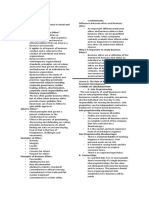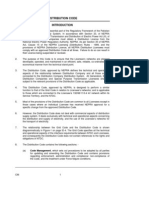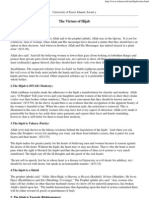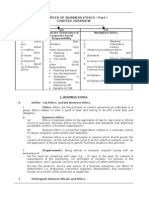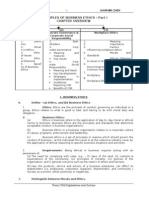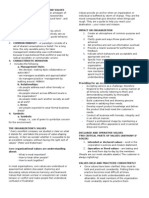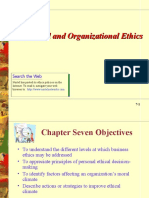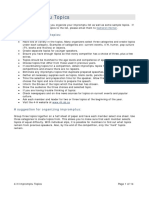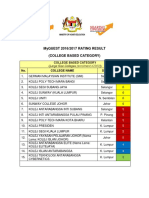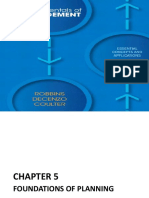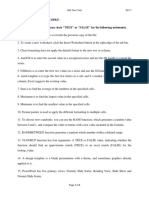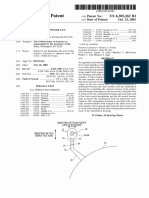Chapter 1 The Foundation of Ethical Thought
Chapter 1 The Foundation of Ethical Thought
Uploaded by
Niz IsmailCopyright:
Available Formats
Chapter 1 The Foundation of Ethical Thought
Chapter 1 The Foundation of Ethical Thought
Uploaded by
Niz IsmailCopyright
Available Formats
Share this document
Did you find this document useful?
Is this content inappropriate?
Copyright:
Available Formats
Chapter 1 The Foundation of Ethical Thought
Chapter 1 The Foundation of Ethical Thought
Uploaded by
Niz IsmailCopyright:
Available Formats
Chapter 1
The Foundation of Ethical Thought
Understanding Business Ethics
Stanwick and Stanwick
2nd Edition
Understanding Business Ethics 2nd Edition © 2014 SAGE Publications, Inc.
1
Ethics in Action
• The foundation arm of Panera Bread has
established the “Panera Cares Café”
program.
– A Panera Cares Café is a café in which the
customers decide how much to pay for their
meal.
• The average Panera Cares café will generate
revenue of $100,000 monthly and yield a
“profit” of $3,000 to $4,000 a month.
– The profits are used to fund job training
programs for high risk young people.
Understanding Business Ethics 2nd Edition © 2014 SAGE Publications, Inc.
2
Ethics
• Defined as the values which an individual
uses to interpret whether any particular
action or behavior is considered
acceptable and appropriate.
Understanding Business Ethics 2nd Edition © 2014 SAGE Publications, Inc.
3
Ethics
• Questions to ask to identify values needed to
interpret ethical action or behavior
1. Is the behavior or action consistent with the
overall basic duties of the individual in question?
2. Does the behavior or action acknowledge and
respect the underlying rights of all the
individuals who will be impacted by the action?
3. Would the behavior or action be considered the
best practice in that specific set of
circumstances?
4. Does the behavior or action match the overall
entrenched beliefs of the individual?
Understanding Business Ethics 2nd Edition © 2014 SAGE Publications, Inc.
4
Business Ethics
• Defined as the collective values of a
business organization that can be used
to evaluate whether the behavior of the
collective members of the organization
are considered acceptable and
appropriate
Understanding Business Ethics 2nd Edition © 2014 SAGE Publications, Inc.
5
The Role of Morals
• Individual moral values have three
components
1. The individual’s principles
2. The individual’s character
3. The consequences of a particular action
Understanding Business Ethics 2nd Edition © 2014 SAGE Publications, Inc.
6
Why is Studying Ethics Important?
• 2012 Study by Ernst & Young among
1,700 executives from 43 countries
– 15% stated they would take cash
payments in the form of a bribe
– 39% responded that bribery and
corruption are common in their countries
– 24% stated that bribery and corruption
have increased
Understanding Business Ethics 2nd Edition © 2014 SAGE Publications, Inc.
7
Foundation of Ethical Theory
• Types of Ethical Examinations
– Descriptive Ethics
– Analytical Ethics
– Normative Ethics
Understanding Business Ethics 2nd Edition © 2014 SAGE Publications, Inc.
8
Descriptive Ethics
• Defined as the presentation of facts
related to the specific ethical actions of
an individual or organization
• Used when an observer wants to
understand the course of events that
generated the ethical issue
Understanding Business Ethics 2nd Edition © 2014 SAGE Publications, Inc.
9
Analytical Ethics
• Described as understanding the
reasons a course of action that may
have an ethical impact took place
• Moves from the how and when inquiry,
which is the basis of the descriptive
ethics viewpoint, to asking why
Understanding Business Ethics 2nd Edition © 2014 SAGE Publications, Inc.
10
Normative Ethics
• Defined as a prescribed course of action
that attempts to ensure that ethical
behavior will be followed in the future
• Moves the evaluation of ethical behavior
from the past to future tense
• Presents information on what should be
done in the future rather than what was
done in the past
Understanding Business Ethics 2nd Edition © 2014 SAGE Publications, Inc.
11
Teleological Frameworks
• Focus on the results of the conduct of the
individual
• Three frameworks are
– Ethical egoism
– Utilitarianism
– Sidgwick’s dualism
Understanding Business Ethics 2nd Edition © 2014 SAGE Publications, Inc.
12
Ethical Egoism
• Based on the belief that every individual
should act in a way to promote himself/herself
if the net result will generate, on balance,
positive rather than negative results
Understanding Business Ethics 2nd Edition © 2014 SAGE Publications, Inc.
13
Utilitarianism
• Any action of an individual will provide the
greatest good for the greatest number of
people
• Based on the principle of utility where each
person’s actions add to the overall utility of
the community
Understanding Business Ethics 2nd Edition © 2014 SAGE Publications, Inc.
14
Sidgwick’s Dualism
• Attempts to resolve the difference of
whether the actions for one’s self-benefit
impact just the individual or others
• Argued that utilitarianism is a foundation
component of any ethical framework
Understanding Business Ethics 2nd Edition © 2014 SAGE Publications, Inc.
15
Deontological Frameworks
• Focus on the duty or obligation in determining
whether the actions are right or wrong
– The three frameworks are
• Existentialism
• Contractarianism
• Kant’s ethics
Understanding Business Ethics 2nd Edition © 2014 SAGE Publications, Inc.
16
Existentialism
• Based on the underlying belief that the
only person who can determine right and
wrong is the person making the decisions
• Each individual determines his or her own
actions and is ultimately responsible for
the consequences of those actions
Understanding Business Ethics 2nd Edition © 2014 SAGE Publications, Inc.
17
Contractarianism
• Also called social contract theory
• Based on the belief that all
individuals agree to social contracts
to be members within a society
Understanding Business Ethics 2nd Edition © 2014 SAGE Publications, Inc.
18
Kant’s Ethics
• The free will to make decisions that
were considered rational needed to be
converted into a universal will
• Considered a dualism because it
attempts to bridge the gap between
the existentialist and contractarian
points of view
Understanding Business Ethics 2nd Edition © 2014 SAGE Publications, Inc.
19
Guiding Principles to Support Ethical
Actions
• Fidelity
• Reparation
• Gratitude
• Justice
• Beneficence
• Self-improvement
• Noninjury
Understanding Business Ethics 2nd Edition © 2014 SAGE Publications, Inc.
20
The Seven Deadly Sins
• For centuries, human behavior has been
evaluated on seven deadly sins.
– Lust
– Gluttony
– Greed
– Sloth
– Wrath
– Envy
– Pride
Understanding Business Ethics 2nd Edition © 2014 SAGE Publications, Inc.
21
Global Business Standards Codex
• The codex captures the eight major
underlying principles in which ethical
behavior can be interpreted and
evaluated
– Fiduciary
– Property
– Reliability
– Transparency
– Dignity
– Fairness
– Citizenship
– Responsiveness
Understanding Business Ethics 2nd Edition © 2014 SAGE Publications, Inc.
22
Fiduciary Principle
• Each officer of a company has a legal
fiduciary duty to act in the best interests of
the stakeholders and other employees
within the firm
Traditional components include ensuring that
there are no actual or potential conflicts of
interest given the actions of the employee
Understanding Business Ethics 2nd Edition © 2014 SAGE Publications, Inc.
23
Property Principle
• Based on the belief that every
employee should respect property as
well as the rights of the owners of the
property
Traditional examples of violations of this
principle include theft, misappropriation of
funds, and wasting resources
Understanding Business Ethics 2nd Edition © 2014 SAGE Publications, Inc.
24
Reliability Principle
• Based on the belief that it is the
employee’s responsibility to honor the
commitments he or she has made to
the firm
– Traditional violations of this principle
include breaching a promise or contract
or not fulfilling a promised action
Understanding Business Ethics 2nd Edition © 2014 SAGE Publications, Inc.
25
Transparency Principle
• Based on the belief that every employee
should conduct business in a truthful
and open manner.
– Traditional violations of this principle
include fraudulent and deceptive actions of
the employee
Understanding Business Ethics 2nd Edition © 2014 SAGE Publications, Inc.
26
Dignity Principle
• Based on the belief that each employee
needs to respect the dignity of all
individuals
– Violations include humiliation, coercion, or
other type of human offenses
Understanding Business Ethics 2nd Edition © 2014 SAGE Publications, Inc.
27
Fairness Principle
• Based on the belief that stakeholders
who have a vested interest in the firm
should be treated fairly
• Four types of fairness
1. Reciprocal Fairness
2. Distributive Fairness
3. Fair Competition
4. Procedural Fairness
Understanding Business Ethics 2nd Edition © 2014 SAGE Publications, Inc.
28
Citizenship Principle
• Based on the belief that every
employee should act as a responsible
citizen in the community
– It is also expected that employees respect
the laws of the community
Understanding Business Ethics 2nd Edition © 2014 SAGE Publications, Inc.
29
Responsiveness Principle
• Based on the belief that employees
have a responsibility to respond to the
requests for information about the
operations from various stakeholders
– Employees must also be responsive to
ideas presented by the stakeholders
Understanding Business Ethics 2nd Edition © 2014 SAGE Publications, Inc.
30
Questions for Thought
1. Which of the teleological frameworks
most closely match your ethical
beliefs? Under what circumstances
would you shift towards another of
the frameworks?
2. Do you think “Greed is Good”? Can a
free market economic system survive
without human greed?
Understanding Business Ethics 2nd Edition © 2014 SAGE Publications, Inc.
31
Questions for Thought
3. Which of the seven deadly sins do you
believe is the most serious to commit?
Which of the seven deadly sins do you
believe is the least serious to commit? Do
you think certain sins have gained or been
reduced in importance over time?
4. Using the principles set forth in the Global
Business Standards Codex, find an example
of a company that does or did not follow
one of the principles. Discuss the
implications of the company’s actions.
Understanding Business Ethics 2nd Edition © 2014 SAGE Publications, Inc.
You might also like
- Loyalty and Ethical Behavior, Ethical Decision MakingDocument28 pagesLoyalty and Ethical Behavior, Ethical Decision MakingSakthi100% (1)
- Business Ethics Module 1Document3 pagesBusiness Ethics Module 1Spencer Asuncion Ü75% (4)
- Acrostic Poem Lesson PlanDocument4 pagesAcrostic Poem Lesson Planapi-306040952No ratings yet
- Manifestation With Formal Offer of Evidence - SAMPLeDocument10 pagesManifestation With Formal Offer of Evidence - SAMPLeAlfred John Pe Lim100% (1)
- Distribution Code FinalDocument176 pagesDistribution Code FinalMuhammad RizwanNo ratings yet
- Business Ethics Lecture NotesDocument84 pagesBusiness Ethics Lecture NotesTim SNS TSM100% (1)
- Chapter 4 Foundations of Decision MakingDocument26 pagesChapter 4 Foundations of Decision MakingNiz IsmailNo ratings yet
- Preparing Clerkship Cover LettersDocument3 pagesPreparing Clerkship Cover LettersUTKARSHNo ratings yet
- Unit 2 Engineering-EthicsDocument42 pagesUnit 2 Engineering-Ethicsyuvaraj sNo ratings yet
- Pashto - Understand - Salah and Quran Merged PDFDocument155 pagesPashto - Understand - Salah and Quran Merged PDFEnamullahNo ratings yet
- The Virtues ofDocument2 pagesThe Virtues ofMateen YousufNo ratings yet
- Ethics - ppt1 (1) With Imp QuesDocument46 pagesEthics - ppt1 (1) With Imp QuesJill SnowNo ratings yet
- Chapter 10Document39 pagesChapter 10Ivan FongNo ratings yet
- Bus - Ethics Chapter1Document41 pagesBus - Ethics Chapter1Hitanshi VishwakarmaNo ratings yet
- BMG933 Week 3Document32 pagesBMG933 Week 3Taimoor BaigNo ratings yet
- Annotated-Competency 202 20powerpointDocument12 pagesAnnotated-Competency 202 20powerpointapi-693321754No ratings yet
- Business EthicsDocument24 pagesBusiness EthicsUzma Ahmed100% (2)
- Lecture 03Document14 pagesLecture 03Ansary LabibNo ratings yet
- Session 2Document17 pagesSession 2shubham singhalNo ratings yet
- IPCC - Law Business EthicsDocument24 pagesIPCC - Law Business EthicsmanishnainaniNo ratings yet
- Business EthicsDocument73 pagesBusiness EthicsRatnottma Pandey80% (5)
- Ethics ContinuumDocument2 pagesEthics Continuumapi-3705077No ratings yet
- (Notes) EthicsDocument7 pages(Notes) EthicsreivisteNo ratings yet
- Ethics Module1 4Document7 pagesEthics Module1 4reivisteNo ratings yet
- ACT1110 - Business Ethics - Additional Materials - PPTDocument21 pagesACT1110 - Business Ethics - Additional Materials - PPTDong WestNo ratings yet
- Lec 1-Biz Ethics-18Sept23Document16 pagesLec 1-Biz Ethics-18Sept23Shahruk AnwarNo ratings yet
- Chapter 6 - Managerial and Organizational EthicsDocument29 pagesChapter 6 - Managerial and Organizational EthicsAdrienne SmithNo ratings yet
- Business Ethics - 3rd Quarter ReviewerDocument3 pagesBusiness Ethics - 3rd Quarter ReviewerDRIFT KMGNo ratings yet
- Week 4 - Business Ethics and Social ResponsibilityDocument15 pagesWeek 4 - Business Ethics and Social Responsibilitymamchel.28No ratings yet
- The Organization's Culture and ValuesDocument2 pagesThe Organization's Culture and ValuesKristine Montenegro100% (2)
- GGSR Midterm ReviewerDocument9 pagesGGSR Midterm Reviewerlunaughh549No ratings yet
- University of Makati: I N T R O D U C T I O NDocument10 pagesUniversity of Makati: I N T R O D U C T I O NMicaella AnneNo ratings yet
- One HSE Culture - EN - v2Document5 pagesOne HSE Culture - EN - v2ajengpuspitasari1992No ratings yet
- Business Ethics Governance and Risk - Chapter 2 PPT BPhji2dfOODocument15 pagesBusiness Ethics Governance and Risk - Chapter 2 PPT BPhji2dfOOmridul jainNo ratings yet
- Personal and Organizational EthicsDocument30 pagesPersonal and Organizational EthicsSimar DhillonNo ratings yet
- Ethics and Social Responsibility: Mgmt6Document25 pagesEthics and Social Responsibility: Mgmt6gabriella IrbyNo ratings yet
- Business Ethics in Action Session 7Document25 pagesBusiness Ethics in Action Session 7Shanuka SapugodaNo ratings yet
- PPTS Uas FinnalDocument21 pagesPPTS Uas Finnalapip ajaNo ratings yet
- Unit 4 Ethics in Human Resource ManagementDocument19 pagesUnit 4 Ethics in Human Resource Managementmohapisthaba77No ratings yet
- Competency 1 Powerpoint 1Document12 pagesCompetency 1 Powerpoint 1api-693321754No ratings yet
- GGSR Notes 022030Document13 pagesGGSR Notes 022030cjmarie.cadenasNo ratings yet
- Business Ethics, Governance & RiskDocument24 pagesBusiness Ethics, Governance & RiskSwapnil KeluskarNo ratings yet
- EthicsDocument4 pagesEthicsDrie LimNo ratings yet
- Reviewer For Good GovernanceDocument8 pagesReviewer For Good Governanceicarellano123No ratings yet
- SESI 14 CH Lecture 14 Creating An Ethical Organization RMITDocument34 pagesSESI 14 CH Lecture 14 Creating An Ethical Organization RMITkimkimberlyNo ratings yet
- MDMN 204 Lesson 5 Ethical Leadership in Public and Public ServiceDocument6 pagesMDMN 204 Lesson 5 Ethical Leadership in Public and Public Servicejonathan cambaNo ratings yet
- Professional EthicsDocument27 pagesProfessional Ethicsdkambe497No ratings yet
- Final Notes EthicsDocument35 pagesFinal Notes Ethicshsknkpx8vkNo ratings yet
- mgmt192 Chp2Document19 pagesmgmt192 Chp2akarimucpNo ratings yet
- LECTURE FinalDocument22 pagesLECTURE FinalBAM BEULNo ratings yet
- Immer NotesDocument15 pagesImmer NotesArianne Ysabel JuradoNo ratings yet
- Ethics and Decision Making Outline 2022Document5 pagesEthics and Decision Making Outline 2022Tin CabanayanNo ratings yet
- Part Three: The Decision Making ProcessDocument23 pagesPart Three: The Decision Making ProcessChi IuvianamoNo ratings yet
- Ethical Decision MakingDocument21 pagesEthical Decision MakingJoelo De VeraNo ratings yet
- 0522 M7e PPT Ch04 AccessibleDocument31 pages0522 M7e PPT Ch04 Accessible妤陈No ratings yet
- Ethical Consideration: UtilitarianismDocument22 pagesEthical Consideration: UtilitarianismMikasa AckermanNo ratings yet
- Ethics and Values in BusinessDocument56 pagesEthics and Values in BusinessSreerag Haridas100% (1)
- Amity International Business SchoolDocument13 pagesAmity International Business SchoolAparna SapraNo ratings yet
- Immer NotesDocument15 pagesImmer NotesArianne Ysabel JuradoNo ratings yet
- Etika KeperawatanDocument23 pagesEtika KeperawatanM. Tasrif MansurNo ratings yet
- Ethics and Corporate ValuesDocument68 pagesEthics and Corporate ValuesAll EthiopiansNo ratings yet
- Unit 1Document46 pagesUnit 1loga prakashNo ratings yet
- The Overview of Business EthicsDocument17 pagesThe Overview of Business EthicsSammy KojoNo ratings yet
- Chapter 7 - Personal and Oraganizational EthicsDocument46 pagesChapter 7 - Personal and Oraganizational EthicsMeloy ApiladoNo ratings yet
- Understanding Business Ethics: First EditionDocument15 pagesUnderstanding Business Ethics: First EditionNiz Ismail100% (1)
- MyQUEST 20162017 RATING RESULT SOCIAL SCIENCES, BUSINESS & LAWDocument7 pagesMyQUEST 20162017 RATING RESULT SOCIAL SCIENCES, BUSINESS & LAWNiz IsmailNo ratings yet
- Impromptu ListingDocument14 pagesImpromptu ListingNiz IsmailNo ratings yet
- Job Description Safety & HealthDocument1 pageJob Description Safety & HealthNiz IsmailNo ratings yet
- Trade Performance For The Month of April 2012 and The Period of January - April 2012Document12 pagesTrade Performance For The Month of April 2012 and The Period of January - April 2012Niz IsmailNo ratings yet
- MyQUEST 20162017 RATING RESULT - COLLEGE BASEDDocument11 pagesMyQUEST 20162017 RATING RESULT - COLLEGE BASEDNiz IsmailNo ratings yet
- Lecture 1 - The Entrepreneurial Mind: Crafting A Personal Entrepreneurial StrategyDocument49 pagesLecture 1 - The Entrepreneurial Mind: Crafting A Personal Entrepreneurial StrategyNiz IsmailNo ratings yet
- Chapter 6 Organizational Structure and DesignDocument45 pagesChapter 6 Organizational Structure and DesignNiz Ismail100% (1)
- Chapter 5 Foundations of PlanningDocument31 pagesChapter 5 Foundations of PlanningNiz Ismail0% (1)
- Chapter 7 Understanding Groups and Work TeamsDocument33 pagesChapter 7 Understanding Groups and Work TeamsNiz IsmailNo ratings yet
- Chapter 3 Integrative Managerial IssuesDocument38 pagesChapter 3 Integrative Managerial IssuesNiz IsmailNo ratings yet
- Diversity in The WorkplaceDocument2 pagesDiversity in The WorkplaceNiz IsmailNo ratings yet
- Chapter 2 The Management EnvironmentDocument23 pagesChapter 2 The Management EnvironmentNiz IsmailNo ratings yet
- Section A (TOTAL: 100 MARKS) Answer ALL Questions. Please Read and Answer Each Question CarefullyDocument3 pagesSection A (TOTAL: 100 MARKS) Answer ALL Questions. Please Read and Answer Each Question CarefullyNiz IsmailNo ratings yet
- ACC2124 Mid-Term Test S2/17Document2 pagesACC2124 Mid-Term Test S2/17Niz IsmailNo ratings yet
- Section A (TOTAL: 15 MARKS) Answer ALL Questions. Please State "TRUE" or "FALSE" For The Following StatementsDocument4 pagesSection A (TOTAL: 15 MARKS) Answer ALL Questions. Please State "TRUE" or "FALSE" For The Following StatementsNiz IsmailNo ratings yet
- Wearesocial 2012Document104 pagesWearesocial 2012Niz IsmailNo ratings yet
- Section A (Total: 20 Marks) Answer ALL Questions. Please Read Each Question Carefully and Fill in The Blanks With The Correct AnswersDocument6 pagesSection A (Total: 20 Marks) Answer ALL Questions. Please Read Each Question Carefully and Fill in The Blanks With The Correct AnswersNiz IsmailNo ratings yet
- MGMT 142-Principles of Management-Zehra WaheedDocument5 pagesMGMT 142-Principles of Management-Zehra WaheedNiz IsmailNo ratings yet
- APPSC GroupI GroupII GO NO 623 Issued NotificationDocument10 pagesAPPSC GroupI GroupII GO NO 623 Issued NotificationMahesh Babu TalupulaNo ratings yet
- ACC507: Cost and Management Accounting: Lecture #0Document23 pagesACC507: Cost and Management Accounting: Lecture #0Farman ArshadNo ratings yet
- Feasibility Study Guide Module-1Document3 pagesFeasibility Study Guide Module-1Jeanlyn Vallejos Domingo100% (1)
- Counseling Settings and Services Where Counselors Could Be FoundDocument11 pagesCounseling Settings and Services Where Counselors Could Be FoundVincent L. SantiagoNo ratings yet
- 1442642157Document364 pages1442642157drumNo ratings yet
- Crowd1 Terms and Conditions: Earnings DisclaimerDocument31 pagesCrowd1 Terms and Conditions: Earnings DisclaimerLaure Bénie KouassiNo ratings yet
- CEED 2015: Certificate From Principal/Head of The DepartmentDocument1 pageCEED 2015: Certificate From Principal/Head of The DepartmentutkagraNo ratings yet
- Consumer and Their Animal CompanionsDocument3 pagesConsumer and Their Animal Companionsmsc_adytNo ratings yet
- Untitled Page Mahen AlDocument1 pageUntitled Page Mahen AlSahil RajputNo ratings yet
- Vernant - Myth and Society in Ancient Greece Chapter Viii HesiodDocument43 pagesVernant - Myth and Society in Ancient Greece Chapter Viii HesiodPatrick SchwarzNo ratings yet
- 2011 Malaysian Open Dressage ResultsDocument13 pages2011 Malaysian Open Dressage ResultsChalermcharn YotviriyapanitNo ratings yet
- Balance Social 2015Document248 pagesBalance Social 2015los toques de lisaNo ratings yet
- Annual Report: Partnerships For A Tolerant, Inclusive Bangladesh ProjectDocument47 pagesAnnual Report: Partnerships For A Tolerant, Inclusive Bangladesh ProjectUNDP BangladeshNo ratings yet
- INCOSE Certification of Systems Engineers: Certification Program Briefing For ChaptersDocument35 pagesINCOSE Certification of Systems Engineers: Certification Program Briefing For ChaptersIndran KunusilinNo ratings yet
- 2 Bar Matter 702Document3 pages2 Bar Matter 702DanielleNo ratings yet
- United States Patent: Wallin (45) Date of Patent: Oct. 23, 2001Document17 pagesUnited States Patent: Wallin (45) Date of Patent: Oct. 23, 2001willNo ratings yet
- BMS TrainingDocument202 pagesBMS TrainingHuy DemonNo ratings yet
- CAG AR2019 Full PDFDocument92 pagesCAG AR2019 Full PDFMaverickNo ratings yet
- Value Chain Analysis of TomatoDocument43 pagesValue Chain Analysis of TomatoSumaiya Shahid Shifa (183011074)No ratings yet
- Annex 5. Questionnaire For New Suppliers Vendor of Calibration ProviderDocument5 pagesAnnex 5. Questionnaire For New Suppliers Vendor of Calibration ProviderAndre PrimaNo ratings yet
- Raven Redmond-Johnsons ResumeDocument8 pagesRaven Redmond-Johnsons Resumeapi-458181868No ratings yet
- Goffman in Dialogue Theories 2 FinalDocument13 pagesGoffman in Dialogue Theories 2 FinalJhosel AnopolNo ratings yet
- Panel 20: South East Asian Manuscript Studies Saturday 17.9.2016Document9 pagesPanel 20: South East Asian Manuscript Studies Saturday 17.9.2016MohamadNo ratings yet
- Using Journalism Skills in The Language ClassroomDocument9 pagesUsing Journalism Skills in The Language ClassroomCamila Escanilla OrdeixNo ratings yet
- SS The Golden Rules of Essay Writing HO Rev1Document2 pagesSS The Golden Rules of Essay Writing HO Rev1Nguyen Quang Hung100% (1)
- Level-Of-Adaptability-Of-Grade-Grade-12-Students 2Document12 pagesLevel-Of-Adaptability-Of-Grade-Grade-12-Students 2Mark Joshua SerranoNo ratings yet
- Cagayan de Oro National High School-Senior High SchoolDocument3 pagesCagayan de Oro National High School-Senior High SchoolEarl Vann UrbanoNo ratings yet

